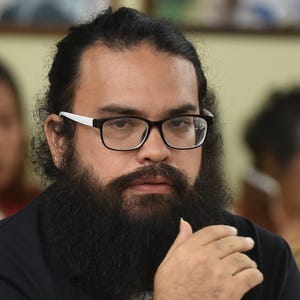The late French philosopher Jacques Derrida referred to “justice” as a term we use for impossible things. It is a word that we use for things that we can’t ever seem to resolve, about the problems of the past and the present. When a wrong is committed, justice is the word we use for things done in the name of fixing the problems that emerge from that violence, from that harm.
But there is no precise science to justice, no easy way to agree upon what is the appropriate means of making amends for something. Criminal justice systems, restorative justice, reparations, apologies — these are all ways that we try to channel the trauma of the past.
There is no equation for justice equivalence. Whatever happens in the name of justice will either be too much or too little. It cannot replace what was taken away, or those who have to give up something in the name of past wrongs, will insist that they shouldn’t have to sacrifice for the sins of others.
But the conversation and the process of dealing with that trauma is what is critical.
Justice can take many forms and appear in unexpected ways, but most scholars agree that the opposite of justice, its greatest anathema, is the idea that systems of inequality, exploitation or violence simply remain in the past and disappear, just because certain people wish that they would.
When explicit forms of legalized violence against others are formally repealed, whether they be imperial, colonial, patriarchal or racial, they do not vanish; they persist sometimes in less obvious forms and sometimes more difficult to recognize forms.
Take for instance the Black Lives Matter movement in the U.S.
In the past, a black life in the U.S. could be taken with near impunity. To kill a black person represented an economic harm, damaging someone else’s property. It wasn’t a moral crime. Even when slavery was abolished in most areas of the U.S., a white person could still discriminate against or physically harm black lives, with either no punishment or significantly less punishment than if they had harmed a white person.
Vestiges of that history persist at the personal and systematic levels, to the point where a black man has a greater chance of being killed by a police officer, and said police officer will be statistically be more likely to not be punished for the death.
The All Lives Matter movement is a way of trying to prevent any type of justice from taking place by pretending that the violent past that marked certain bodies as being less valuable than others is long over.
Black Lives Matter does not preclude all lives having value. If anything, it is a call to remember that all lives should matter, but the demons of America’s racist past create a present where basic statistical truths indicate that some lives matters less than others.
On Guam, we deal with our own problems of this sort, in particular what can be done about the island’s continuing colonial status.
There are those who argue that things such as decolonization are unconstitutional, illegal or anti-American. According to international law, however, the rights to decolonization and self-determination are clear.
The native inhabitants of Guam have long been denied a fair shot at deciding their political destiny, and a decolonization plebiscite will represent an important symbolic moment in reversing hundreds of years of colonial disenfranchisement.
Michael Lujan Bevacqua is an author, artist, activist and assistant professor of Chamorro studies at the University of Guam.



No comments:
Post a Comment